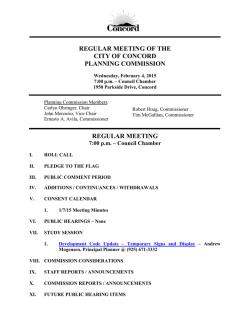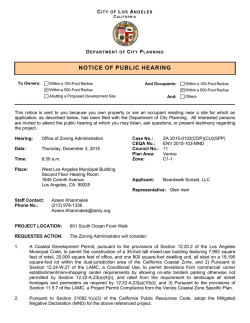
TRIH Grant 2016 - Action on Hearing Loss
TRIH Grant 2016 The Translational Research Initiative for Hearing (TRIH) Grant aims to help strengthen the translation of fundamental research towards patient benefit. It supports: • Applied research with a strong commercial potential that is likely to attract follow-on funding at the conclusion of the grant. • Studies that will facilitate and enable the progression of promising basic research towards testing in clinical trials. The TRIH Grant does not support basic research into the causes and underpinning biology of hearing loss and tinnitus or the development of devices or software. Summary of grant • • • • Duration: Up to three years Eligibility: Applicants may be from any country and may be from academic institutions and small/medium enterprises (SMEs) Value *: Up to £100,000 per year. Deadlines - Expression of Interest: 14 March 2016 (5 pm GMT) - Full application (by invitation only): 23 May 2016 (5 pm GMT) - Funding decisions: October 2016 * Please note that as a charity, it is our policy not to fund any indirect costs or the salaries of permanent employees. Requirements and eligibility The scope of the TRIH call varies from year to year. This year, applications will be accepted in the following areas: • Small molecule, gene or cell-based approaches for the treatment of hearing loss or tinnitus. This can include: - Studies which will enable lead optimisation and/or candidate selection. - Pharmacokinetics/Pharmacodynamics (PKPD) studies. - Safety/toxicology studies. - Drug repositioning/repurposing (applications must contain preliminary data supporting the proposed approach) • Research that addresses at least one of the following “TRIH Challenge” topics - Validation of therapeutic targets for the treatment of hearing loss or tinnitus (applications must contain preliminary data supporting the proposed approach). 1 - Studies to strengthen confidence that a target or therapeutic approach will be applicable to human hearing loss or tinnitus. Preclinical model validation i.e. studies to increase the understanding of invivo or in-vitro model relevance to human hearing loss or tinnitus. Identification/validation of methods or outcomes that could be used for one or more of the following: Patient selection/stratification for clinical trials Robust measurement of treatment responses in clinical trials. This year, applications will not be accepted in the following areas: • • • • • Basic research into the causes and underpinning biology of hearing loss and tinnitus The development of devices or software Novel drug delivery to the ear The optimization of current clinical protocols Health service studies Application procedure This grant application will follow a two stage process: 1. Expression of Interest - All applicants must submit an Expression of Interest. The purpose of the Expression of Interest is to obtain enough information on the proposed project to enable us to understand how well the proposal aligns with the criteria of the TRIH scheme. Applicants with proposals meeting the criteria of the scheme will be invited to submit a full application. 2. Full Application - Applications that successfully complete the Expression of Interest stage will be invited to submit a Full Application. 2 Overview of the application and selection procedure * At this stage full applications are sent to the TRIH partners (prior to this, applicants have the opportunity to list any TRIH partners they do not wish to see their application). TRIH partners are not involved in the review process but have the opportunity to express interest in providing support to projects. ** TRIH Funding Review Panel • • • • • • • • • Dr Rick Cousins (GSK) Dr Paul England (InMedD) Dr Paul Fletcher (Leigh-Abbot Consulting Limited) Dr Jonathan Gale (University College London) Dr Fiona Marston (Sapere Systems Ltd) Professor Gerard O’Donoghue (Nottingham Hearing Biomedical Research Unit) Dr Marielle Portier (Otopharm) Professor Karen Steel (King's College London) Dr Chris Watkins (Medical Research Council) 3
© Copyright 2026

